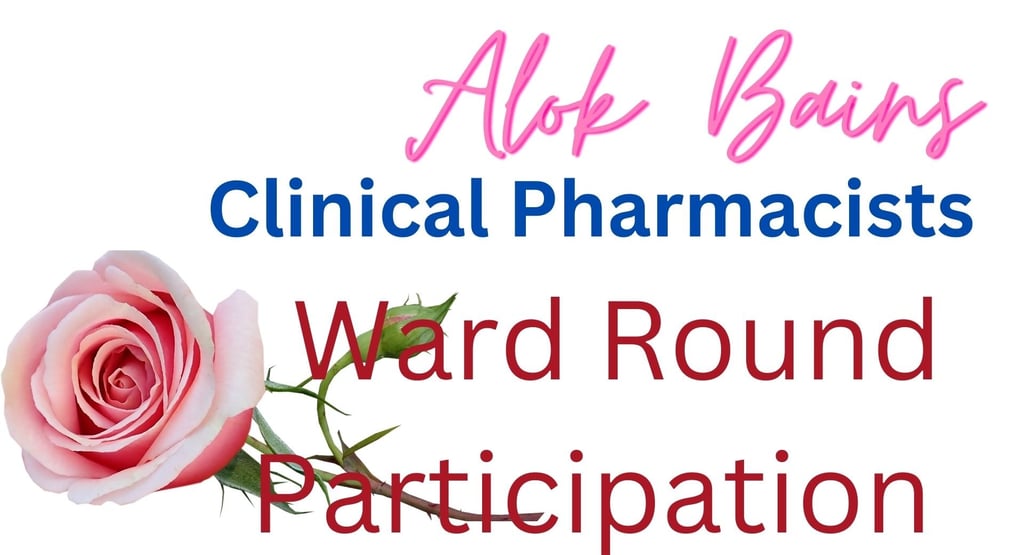Clinic Pharmacists Ward Round Participation
Clinical Pharmacists Hospital Ward Round Participation as their Daily Activities
HOSPITAL PHARMACY
Alok Bains
4/29/20234 min read


Daily activities of clinical pharmacists: Ward Round Participation
Goal, Definition, and Procedure.
Compiled by: Alok Bains
Pharmacists are custodians of medicines and legal lords of medicines. They not only manage and dispense medicines but also influence prescriptions in the best interest of patients. Clinical pharmacists participate as team members with physicians and nurses to influence clinical care decisions through pharmaceutical care.
Clinical pharmacist Hospital ward rounds participation has the following advantages:
Ensure quality pharmaceutical cares
Improve quality assurances and safety of medications,
Effective administration of medicines,
Promote rational use of medicines,
Reduced prescription error.
Reduced prescription costs.
Monitoring of adverse drug effects,
Improve patients-heath care providers communication,
Decrease potential risk to patients in the hospital.
Better patient outcomes,
Reduced hospital stay of the patients.
More cost-effective treatment,
Accuracy of drug history documentation,
Definitions
Ward Round: The visit of health care professionals to hospital in-patients at their bedside to review and follow up outcome of the health care delivery is called ward rounds.
Clinical pharmacists: Clinical pharmacist is a specially trained pharmacy practitioner to provide direct patient care to optimize medication management and promotes patients’ health.
Pharmacist Intervention: Any verbal or written communication from a pharmacist to medical staff, nursing staff and patient with the intention to influence medicines recommendation is called “pharmacist intervention”,
Goal/Objectives
Goal/Objectives of the clinical pharmacists’ activities during ward round participation
Clinical pharmacists are important members of the health care team in the hospital. They actively participate in ward rounds with medical staff and nursing staff. Their activities to influence Patients' medication during ward rounds is clinical pharmacists’ intervention. Multidisciplinary ward round is time consuming process but it is beneficial for patients.
The main Goal/objective of clinical pharmacists’ activities during ward round participation is “Patients centred activities to optimize medication and minimize medication risks.”
By achieving the following goals clinical pharmacists achieve their main goal:
Optimization/improvement of therapeutic management. This influence
the selection of drugs,
The implementation of dosage regimen,
The drug administration,
The Monitoring and Follow-up Actions.
This helps in the Promotion of responsible and sensible drug use and maximizes therapeutic management.
Reduction in morbidity and mortality,
Investigation of unusual medicine orders or dosages,
Adverse drug reaction detection, management and prevention. It helps to decrease adverse drug reaction rates.
Drug interactions detection, management and prevention,
Enhancement of patient cares and shortens hospital stay. Pharmacists contribute to patient care through the dissemination of drug information and encouragement of sensible drug use.
Participation in patient discharge planning.
Decrease in cost of care.
Find out more about the patients' co-morbidities, medication compliance, or use of alternative medicines that may be important for their care.
Clinical review, counselling, communication with patients,
Improved understanding of the patient's clinical status, planned investigation, therapeutic goal and progress in treatment.
Procedure:
Pharmacists’ participation in ward rounds with other medical professionals was started in UK and US in the 1970s. Clinical pharmacists’ daily activities in ward round participation are divided into two parts. These are Pre-ward round participation and Ward round participation.
Pre-ward round participation: Pharmacists must equip themselves with the followings before participation in ward rounds with medical staff and nursing staff.
Knowledge of patients’ health state, disease management, accurate prior medical history and current medical history for effective participation in clinical decisions.
Review the medication chart and case profile of the patient.
Potential drug issues and disease-related issues are to be raised by the pharmacist during ward round participation.
Preparation of corrective measures for drug-related issues.
Updating the unique patient profile that includes information related to each patient’s medication regimen.
Tips: Prepare for ward round participation before a round begins. Give ward round priority over other duties. Make assures all medication recommended adhere to the hospital formulary. Carry the proper reference when working in the hospital wards (MIMS, CIMS, NF). Prepare and offer solutions to the issues of potential drug-related problems (DRPs) found. If several DRPs are found, rank them and talk about the most crucial one. Avoid conversations related to diagnosis,
Ward round participation: Any action taken by the pharmacists that directly influence the change in the patients' care or therapy is referred to as a pharmacist’s intervention. During medication chart review, etc there are opportunities for intervention.
Pharmacists’ intervention may be in the following forms (types).
Active Pharmacists’ Intervention: Recommendations to influence prescription medication during in-person visits.
Passive Pharmacists’ Intervention:: Informational service on drugs.
Reactive behaviour Pharmacists’ Intervention: Keeping an eye on prescriptions and requesting changes to those that are unclear, insufficient or unsuitable.
The major drug-related queries that may arise during ward rounds are related to:
Dose and frequency,
Choice of medication,
Adverse effect.
Drug interaction,
Formulation,
Duration of therapy,
Drug availability,
Storage uses.
Communication during Hospital ward rounds:
Clinical pharmacists must work closely with other healthcare professionals to satisfy patient requirements.
Strong participation in ward rounds requires both clinical expertise and effective communication abilities.
Successful inter-professional interactions are essential,
Try to handle disagreements in a straightforward way that should also demonstrate respect for others.
Clinical pharmacists can follow conversations between professionals and patients by learning the regional language. Additionally, it enables you to communicate clearly with the patients.
Exercise caution while talking about the drug in the ward in front of the patient.
Avoid guessing and bluffing about data. Make an effort to gather the necessary data so that it could be shared with the doctors.
Do not question the morality of the doctor.
Compiled by Alok bains
